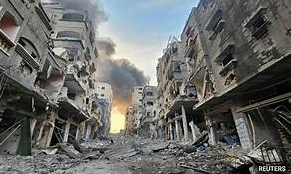The death of Hassan Nasrallah has plunged the Lebanese militia into a war for its own survival.
Israel has announced the death of Hassan Nasrallah, Hezbollah’s leader for over three decades, following a strike on his headquarters in Beirut. The attack reportedly also killed several of his senior commanders, including Ali Karki, leader of the southern front, and Abbas Nilforoushan, the Quds Force commander in Syria and Lebanon. This operation follows a string of targeted strikes, beginning with the “pager attacks” on September 17, which took out multiple high-ranking officials. Just a day before Nasrallah’s death, Muhammad Hussein Srur, Hezbollah’s drone commander, was also killed. Initially, Hezbollah denied Nasrallah’s death, but silence followed.
This assassination marks a significant departure from previous targeted attacks, representing a complete decapitation of Hezbollah’s leadership. In the days leading up to his death, Nasrallah witnessed Israel systematically dismantling his chain of command, leaving the organization without a leader and struggling to respond to Israel’s ongoing offensives. On Saturday morning, Israeli forces continued their attacks on Hezbollah’s positions in Beirut’s Dahiyeh suburb, a known Hezbollah stronghold, and southern Lebanon, targeting rocket launchers and other assets.
Without Nasrallah, Hezbollah faces significant obstacles to reorganizing and retaliating, with Israel dismantling much of its infrastructure and strategic capabilities. Additionally, Iranian resupply efforts have been hindered, further straining Hezbollah’s resources. The destruction of a bridge linking Syria to Lebanon has disrupted crucial supply lines, complicating Hezbollah’s efforts to regroup.
Israel has since scaled back talk of a land invasion, with military officials suggesting that the success of the air strikes has minimized the necessity for ground forces. For now, Israeli forces appear focused on degrading Hezbollah’s capabilities from the air, avoiding the potential costs of a prolonged occupation.
While the possibility of a ground invasion remains uncertain, Israel’s current air campaign has caused unprecedented damage to Hezbollah. The organization’s future, now leaderless and operationally weakened, faces a precarious path as it grapples with the consequences of Israel’s relentless strikes.
Amid these developments, regional analysts are watching closely to see if Hezbollah can adapt to this loss of leadership or if its downfall is imminent. The organization’s role in Lebanon and its alignment with Iran could face significant changes in the wake of Nasrallah’s assassination.

